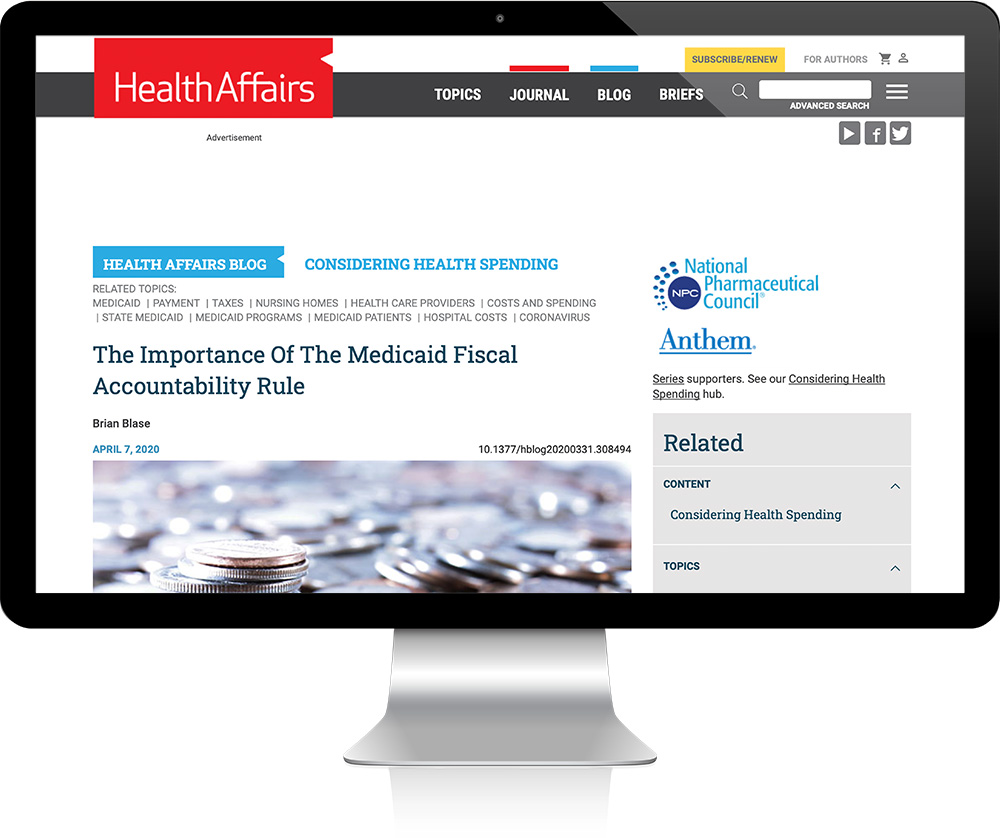OVERVIEW
To help the country deal with the coronavirus epidemic, Congress has provided additional funding to states through their Medicaid programs, and much more may be coming. Galen Senior Fellow Brian Blase, in a major new article published today in Health Affairs, explains the vital importance of ensuring that Medicaid funds are spent on health care for enrollees and not “kickback deals” that reduce program integrity and divert federal money intended for the poor.
“Proper program integrity—for policy makers to know where the Medicaid dollars are going and that they are being used for their intended purpose—has likely never been more important,” Blase writes.
Fortuitously, the Centers for Medicare and Medicaid Services (CMS) last year proposed the Medicaid fiscal accountability rule. Blase writes that this rule “will be needed more than ever given that federal Medicaid spending will likely grow significantly as a response to the coronavirus epidemic.”
“This [Medicaid accountability] rule also shows the extent to which a welfare program is being used to enrich certain politically powerful institutions and providers and to divert federal money intended for the poor for other purposes. This proposed rule takes important and overdue steps to address long-standing problems and implement commonsense reforms. If finalized, this rule will help ensure that extra Medicaid money flowing to states as a reaction to the coronavirus epidemic will make it to the intended recipients and for the intended purposes,” Blase writes.
“If finalized, the rule would increase program transparency to promote better policy making and oversight, ensure that Medicaid funds benefit program enrollees, and better uphold the shared financing design of Medicaid, which stipulates how program costs are shared between the states and the federal government. The rule also would reduce cronyism by placing important constraints on arrangements that states and providers have developed that function as kickbacks.”
Vested interests are threatened by the rule and aim to block accountability and reform. “But the proposed rule is largely about enforcing existing law, not about implementing new policy,” he explains. “CMS must overcome the entrenched interests and finalize this rule to protect the integrity of the Medicaid program and ensure that states make real contributions and Medicaid dollars are spent on Medicaid enrollees’ care.”
Blase provides numerous examples about the proliferation of Medicaid financing schemes and scams that political leaders have been trying for decades to contain, such as:
- Schemes that undermine joint federal-state responsibility to finance Medicaid
- Political favoritism and lack of accountability
- Diversion of Medicaid funding away from Medicaid recipients
Blase recommends actions for CMS to:
- require better data, and make them public
- prevent kickbacks and ensure funds go to Medicaid enrollees
- limit public provider reimbursements to actual costs
- require regular review of supplemental payments
- set upper bounds on supplemental payments
- adopt strong enforcement mechanisms
- finalize this rule.
Blase concludes: “The proposed rule contains important reforms that would help ensure that financing arrangements are consistent with the statute and don’t function as kickback deals that reduce program integrity and harm taxpayers or enrollees.” Preventing the kickback schemes would assure funds go to Medicaid enrollees, not to line the pockets of politically-connected contractors and other entrenched interests.
Read the full article in HealthAffairs

